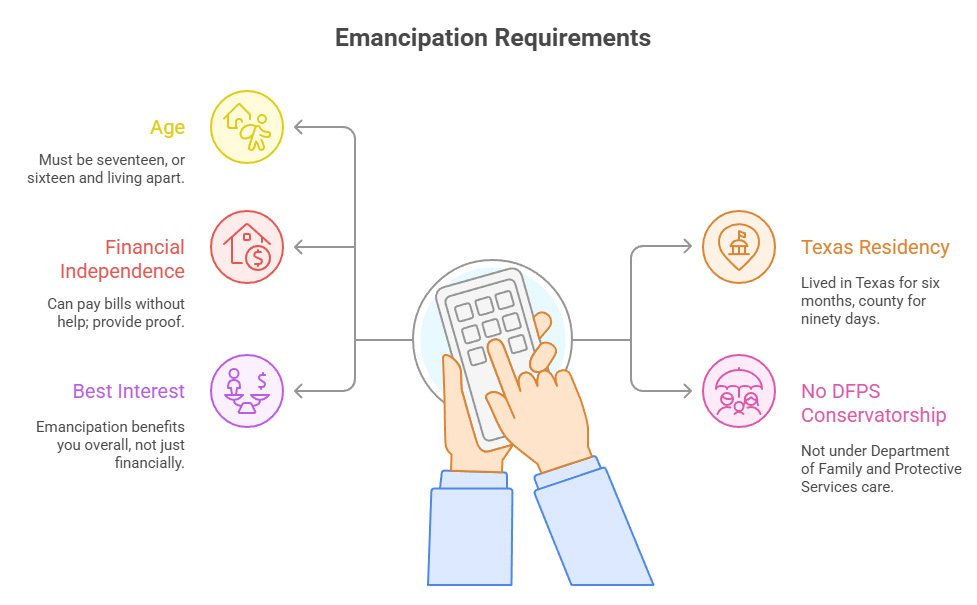Texas Emancipation Eligibility, Filing Steps, and Costs
Minors in Texas who are sixteen or seventeen and already supporting themselves can ask a court to “remove the disabilities of minority,” a legal process most people call emancipation. The right to file comes from Texas Family Code §§ 31.001–31.007, which still read the same after the 2025 legislative session.
This guide walks you through every current requirement, from proving separate residence to answering a judge’s questions, and explains the limited shortcuts available through marriage or military enlistment. It also flags common pitfalls – like losing child-support eligibility – and offers links to updated forms, filing fees, and county resources. Use the information here to decide whether emancipation makes sense for you, then speak with a qualified family law attorney before taking your next step.
Eligibility and Filing Requirements (2025)
Texas still follows the rules set out in Family Code §§ 31.001 – 31.007. To file a petition to “remove the disabilities of minority,” a minor must meet every item in the checklist below.

Quick-view checklist:
- Age. You are seventeen, or sixteen and already living apart from your parent or guardian.
- Texas Residency. You have lived in Texas for at least six months and in the county where you file for at least ninety days.
- Financial Independence. You can pay rent, food, and other bills without help; judges often ask for pay stubs, bank statements, or a signed job offer.
- No DFPS Conservatorship. Minors under Department of Family and Protective Services care must wait until the case closes or ask the agency’s attorney to join the petition.
- Best Interest. The court must find emancipation benefits you overall, not just financially.
Filing venue and forms
- Where to file. Submit the petition in the district court of the county where you live. If your parent, managing conservator, or guardian lives in another Texas county, you may file there instead.
- Form. Use the “Petition to Remove Disabilities of Minority” available on TexasLawHelp. Make sure the footer shows “Revised April 2025.”
- Service of process. A constable or private process server must hand-deliver a copy of the petition to each parent or conservator unless their rights were terminated.
Court costs and fee waivers
Filing fees vary by county, generally $280 to $350. If you cannot afford the fee, complete the “Statement of Inability to Afford Payment of Court Costs” and attach proof of income; judges frequently grant waivers for teens working low-wage jobs.
Typical documents judges expect
- Lease or notarized letter from the person you live with
- Three recent pay stubs, W-2, or job-offer letter
- High-school transcript or GED enrollment letter
- Monthly budget showing rent, utilities, food, and transportation
Bringing organized copies of these records shows the court that you manage your own affairs and understand the responsibilities you are requesting.
What happens to child support
If you receive child support, it can end once emancipation is granted under Family Code § 154.001(a)(2). Link to your updated guide on Texas child-support calculations for 2025 so readers can see how the numbers change.
Step-by-Step Guide to Filing Your Petition (2025)
Step 1: Gather Proof of Independence
- Collect three recent pay stubs or a signed job-offer letter.
- Print a copy of your lease or bring a notarized letter from the adult you live with.
- Prepare a simple monthly budget that lists rent, food, utilities, phone, and transportation.
- Add a current school transcript, GED enrollment letter, or proof of graduation.

Step 2: Download and Complete the Petition
- Download the form titled “Petition to Remove Disabilities of Minority” (Revised April 2025).
- Fill in every blank neatly. List your full legal name, date of birth, and current address.
- Write the county where you will file and the names of both parents or guardians.
- Leave the signature line blank until you can sign in front of a notary or court clerk.
Step 3: File at the District Clerk’s Office
- Bring the completed petition, your proof documents, and the filing fee (usually $280 – $350).
- Ask the clerk for a cause number and a stamped copy of your petition.
- If you need a fee waiver, submit the “Statement of Inability to Afford Payment of Court Costs” along with supporting income proof.
Step 4: Serve Your Parents or Guardians
- Give a sheriff, constable, or private process server the stamped petition and a copy of any hearing notice.
- Service costs run $75 – $125, depending on the county and distance.
- Keep the Return of Service form once it is filed; the judge will not hear your case without it.
Step 5: Attend the Court Hearing
- Dress neatly and arrive at least thirty minutes early.
- The judge may ask about your income, housing, school plans, and why emancipation is in your best interest.
- Be ready to explain how you will handle emergencies without parental help.
Visual tip: Add a sidebar quote box with common judge questions such as “How long have you been paying your own rent?”
Step 6: Collect the Order and Update Your Records
- After the judge signs the Order Removing Disabilities of Minority, buy at least two certified copies (about $5 each).
- Take one copy to your school registrar, bank, and employer.
- Use the other copy for DMV, Social Security, or passport updates.
Typical timeline: Most cases take forty-five to sixty days from filing to signed order, assuming service is completed quickly.
Rights and Responsibilities After Emancipation (2025)
Winning your petition changes many day-to-day realities, yet a few age-based rules remain in place. Use the lists below to see what opens up for you and where the law still draws the line.
New legal powers you gain
- Sign a lease, loan, or other contract without a co-signer
- Open checking, savings, and investment accounts in your own name
- Apply for a credit card or personal loan
- Buy, sell, or title a car
- Make your own medical and dental decisions
- Register a business and sign employment agreements
- Sue or be sued in your own capacity
- Apply for public benefits such as SNAP or Medicaid, if you qualify
Responsibilities that come with those powers
- Pay debts you sign for and meet all contract terms
- File a tax return if your income meets IRS thresholds
- Keep proof of auto insurance and vehicle registration up to date
- Maintain health-insurance coverage or pay out of pocket
- Follow local housing codes and landlord-tenant rules
- Budget for emergencies; parents are no longer required to help
Limits that still apply after emancipation
- Voting and jury duty require you to be eighteen
- Alcohol, tobacco, and vaping sales remain restricted until twenty-one
- Lottery tickets and casino gambling stay off-limits until eighteen
- Concealed-carry licenses are available only at twenty-one, with narrow exceptions
- High-school attendance is still compulsory until graduation or age eighteen
- Selective Service registration is mandatory for males at eighteen
If you receive child support, payments usually end once the emancipation order is signed; talk with your parent or their attorney so everyone updates the Texas Domestic Relations Office promptly. Linking this section to your updated 2025 child-support guide helps readers move straight to the next decision.
Costs and Timeline (2025)
Understanding the basic court costs and how long the process usually takes helps you set realistic expectations before filing.
Filing and court fees
- Petition filing: $280 – $350, set by the county clerk
- Service of process: $75 – $125 per parent or conservator, paid to a constable or private server
- Certified copies of the order: about $5 each (buy at least two)
If those numbers stretch your budget, submit the “Statement of Inability to Afford Payment of Court Costs” with recent pay stubs or a benefits letter. Judges often approve waivers for teens earning entry-level wages.
Tip: Some minors choose to hire a family-law attorney to draft the paperwork, handle service, and appear at the hearing. If you explore that option, ask for a written fee agreement so you know the total cost up front.
Expected timeline
- Document gathering: three to seven days to collect pay stubs, lease, and budget
- Petition drafting and notarizing: one to two days
- Clerk filing and citation issuance: same day in most counties
- Service on parents or guardians: seven to fourteen days, longer if they live out of state
- Court hearing: scheduled thirty to forty-five days after filing, depending on the judge’s docket
- Order pickup and certified copies: same day or within forty-eight hours after the hearing
Most straightforward cases wrap up in forty-five to sixty days from filing to final order. Contested petitions or missed service deadlines can push the process to three months or more.
Budget checklist
- Set aside at least $400 for filing, service, and certified copies
- Add travel costs if your court is in a different city
- Keep a small cushion for unexpected postage or additional service attempts
Track each expense and keep every receipt; you may need them when requesting fee waivers or reimbursements.
Risks and Downsides of Emancipation
Emancipation gives you new freedoms, yet it also removes important safety nets. Weigh these trade-offs before you file.
Financial strain
- No child support: Payments usually stop the day the order is signed. You must cover rent, food, clothing, and school costs on your own.
- Healthcare expenses: Parents’ insurance plans rarely keep emancipated minors. Private coverage or Medicaid may cost more than expected, and paying medical bills out of pocket can drain savings quickly.
- Credit pitfalls: Signing a lease, loan, or utility contract without stable income risks late payments, fees, and damaged credit – problems that can follow you into adulthood.
Limited social services
Most programs for minors assume a parent or guardian can step in during emergencies. After emancipation, agencies may treat you as an adult who should manage crises independently, which can slow access to shelters, counseling, or short-term grants.
Legal liability
Every contract you sign becomes fully enforceable. Missing a payment can lead to lawsuits, judgments, or wage garnishment. Landlords and lenders are less forgiving when no parent is available to guarantee the debt.
Relationship impact
Petitions often create tension with family members. Even if a judge approves emancipation, strained relationships can make holidays, school events, and emotional support harder to navigate.
Difficulty reversing course
Texas law has no simple way to “undo” emancipation. Once the order is final, returning to legal minority status requires a separate court case and is rarely granted. If living costs rise or a job falls through, you cannot force parents to resume financial responsibility.
Alternatives to Emancipation
If you are not sure emancipation is the right fit, or you do not meet every requirement, consider these options that still provide greater independence while keeping some parental support in place.
Limited power of attorney
Parents or guardians can sign a limited power of attorney giving you authority to handle specific tasks – such as enrolling in school, consenting to medical care, or signing a lease – without ending their legal responsibility. The document can last up to six months and be renewed as needed. It is quicker to draft than a court petition and costs little more than a notary fee.
Temporary guardianship with a relative
Living with a trusted adult – grandparent, aunt, older sibling – can create a stable home while parents remain legally responsible. A court order or notarized agreement allows the relative to make school and medical decisions. This arrangement often satisfies judges who want proof of adult supervision but lets you stay close to family.
Extended foster care or transitional living programs
Teens involved with the Department of Family and Protective Services may qualify for extended foster care or a supervised independent living program. These options provide a stipend, housing, and case-management services until age twenty-one, offering financial support that full emancipation would remove.
Joint management agreement
In some counties, courts approve agreements where parents and minors share decision-making authority for finances or healthcare. You gain the power to sign contracts and manage income while parents remain a legal safety net. Judges like this option when the family communicates well and wants a gradual shift toward independence.
School or community resources
High schools, community colleges, and nonprofits often run programs that help minors find part-time jobs, apply for housing assistance, and learn budgeting skills. Taking advantage of these services can bridge the gap between dependence and full legal adulthood without involving a court.
FAQ on Emancipation
Can I get emancipated in Texas at 15?
Generally, no. Texas courts allow petitions from minors who are at least sixteen and already living apart from their parent or guardian, or minors of any age who are legally married. If you are fifteen, the judge will dismiss the case unless you meet the marriage exception. Consider a limited power of attorney or a guardianship arrangement until you reach sixteen.
How long does the emancipation process take in 2025?
Most cases finish in forty-five to sixty days from the day you file the petition. The biggest variables are how quickly your parents or guardians are served and the judge’s docket. Contested petitions or delayed service can stretch the timeline to three months or more, so plan your budget and living arrangements accordingly.
Will I need my parents’ consent to join the military if I’m emancipated?
No. Once the court removes the disabilities of minority, you may enlist without parental consent as long as you meet all branch-specific age, education, and fitness requirements. Bring a certified copy of your emancipation order to the recruiter’s office so it can be added to your enlistment file.
Does emancipation let me buy a car without a co-signer?
Yes. An emancipated minor may sign a purchase agreement, apply for a loan, and title a vehicle in their own name. Lenders will still look at your income, credit history, and debt-to-income ratio, so you may face higher interest rates than an adult with established credit. Shop around and read every contract before signing.
Can child support stop automatically after emancipation?
Usually, yes. Texas Family Code § 154.001 allows child-support obligations to end once a minor is emancipated. Your parent or their attorney must file a motion to terminate support or submit the emancipation order to the state disbursement unit. Confirm that payments have stopped and update any existing wage-withholding orders to avoid future collection issues.
Schedule a Free Consultation
Emancipation is a big step. A short call with a Texas family lawyer can help you understand the paperwork, the timeline, and the risks before you file. Call (832) 759-5100 or click the button below to pick a convenient time for a free consultation. We’ll listen, answer your questions, and map out your next move – no pressure, no obligation.


